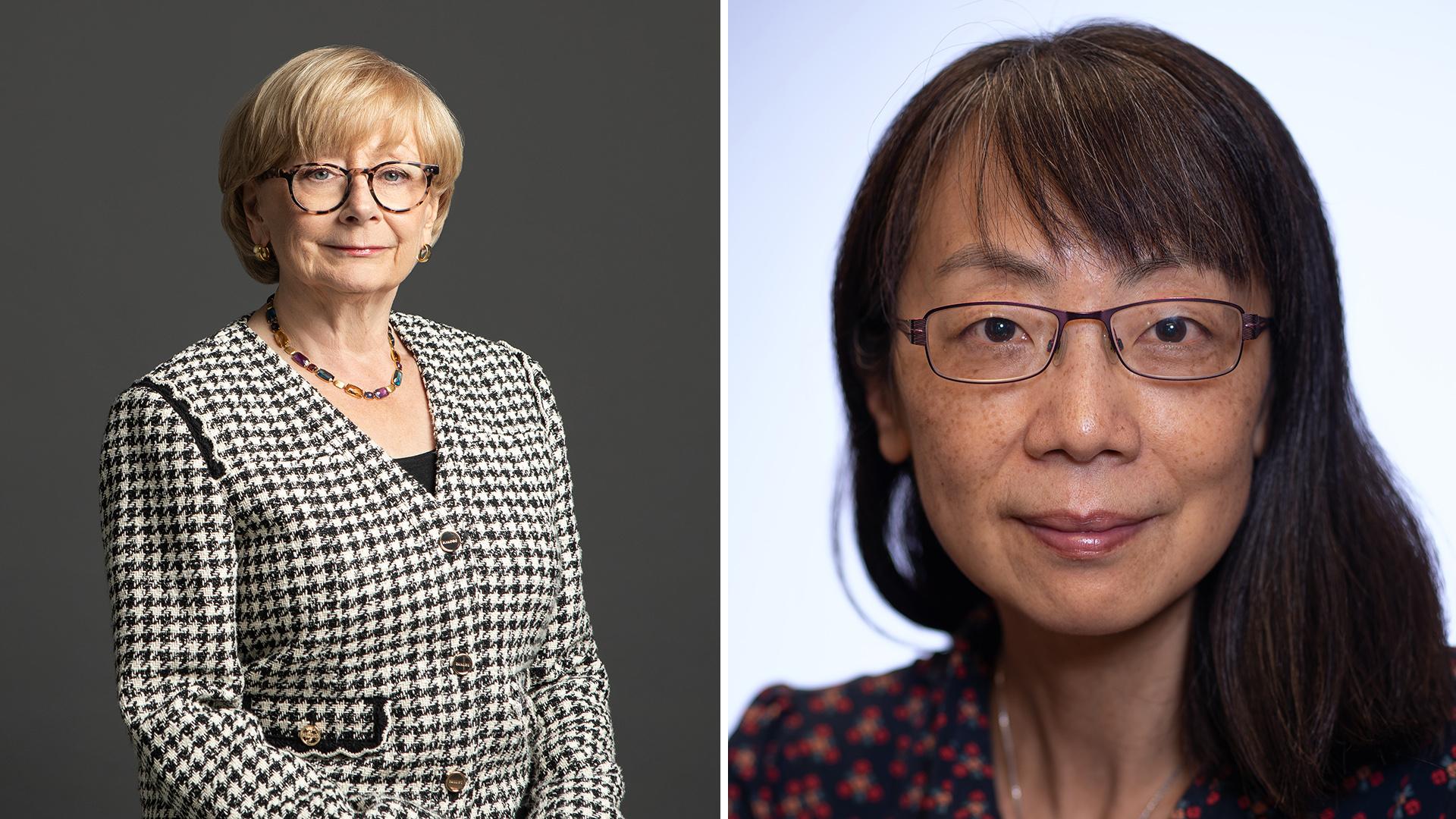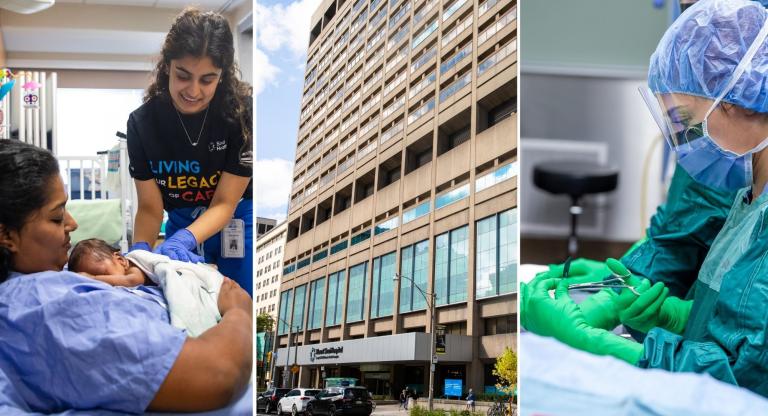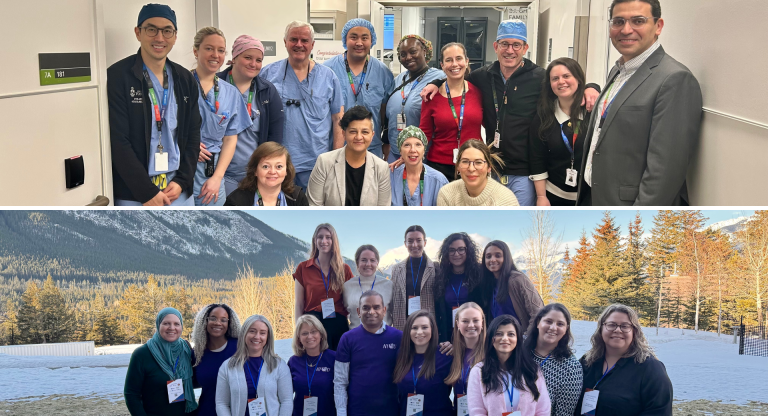Sinai Health researchers elected to the Royal Society of Canada

Medical oncologist Dr. Pamela Goodwin and neuroscientist Dr. Mei Zhen have been elected Fellows of the Royal Society of Canada (RSC).
Recognized for their trailblazing research, they join a community of distinguished Canadians who have made remarkable contributions to society at home and internationally. With this announcement, thirteen Fellows of the RSC are members of the Lunenfeld-Tanenbaum Research Institute (LTRI) at Sinai Health.
The Fellowship is one of the highest national honours. Founded in 1882, the RSC recognizes and promotes excellence in Canadian research, scholarship, and arts, advising governments and the public on matters of public interest.
Transforming breast cancer care
Dr. Pamela Goodwin is a Senior Investigator at LTRI and a globally recognized medical oncologist and researcher whose groundbreaking work has reshaped how breast cancer is understood and treated.
In the 1980s, Dr. Goodwin was among the first to challenge conventional thinking by linking obesity to breast cancer outcomes. She explored how a patient’s own biology—known as “host factors”—could influence cancer progression. Her studies revealed that obesity and elevated insulin levels were associated with higher risks of recurrence and death in breast cancer patients. These findings helped pave the way to the widespread recognition of obesity as a cancer risk factor.
Dr. Goodwin didn’t stop at identifying problems—she sought solutions. She led clinical trials to test lifestyle interventions, such as exercise and weight management, for breast cancer survivors. Her research showed that these programs were feasible, well-tolerated, and improved patients’ quality of life. This work inspired the world’s largest ongoing study that’s looking to establish if weight loss and physical activity impact survival in breast cancer patients.
In parallel to her efforts to understand the biological link between elevated insulin and breast cancer, Dr. Goodwin also explored whether metformin, a diabetes drug that lowers insulin and other obesity-associated metabolic factors, could benefit cancer patients. She led a major international trial, involving over 3,600 participants, which found that metformin may benefit a subset of breast cancer patients, opening doors for new treatment strategies. She is currently exploring the contribution of host factors to the important problem of late recurrence in hormone receptor-positive breast cancer.
Beyond research, Dr. Goodwin has pioneered integrated, patient-centered care. She was the inaugural director of the Marvelle Koffler Breast Centre at Mount Sinai Hospital, Canada’s first comprehensive breast cancer center that combined screening, diagnosis, treatment, and support services under one roof. Her leadership helped establish programs in genetics, digital imaging, and survivorship care that have since been adopted nationwide.
Dr. Goodwin has received many accolades for her work, including recognition from the American Society of Clinical Oncology and as a long-standing grantee of the Breast Cancer Research Foundation in the US. Most recently, Dr. Goodwin has been honoured with the prestigious O. Harold Warwick Prize for outstanding achievements in cancer control research from the Canadian Cancer Society, and is a Fellow of the Canadian Academy of Health Sciences.
Understanding the logic of brain development
Dr. Mei Zhen is a Senior Investigator at LTRI and a world-renowned neuroscientist, whose innovative research is helping us understand how brains develop, function, and sometimes go awry. She began her research with a tiny worm called Caenorhabditis elegans and subsequently made groundbreaking discoveries, both fundamental and medical, in vertebrate models and humans, shedding light on how our brains are designed and function, and how we can treat neurological diseases.
Her research focuses on how brain cells, or neurons, form connections and communicate. Early in her career, she developed specialized tools to visualize and measure the function of synapses—the points where neurons connect—in living animals. Using these tools, her team discovered several key molecules for the formation and function of synapses. Among them are the components of an ion channel, known as the sodium leak channel, that helps neurons to maintain their electrical balance. Dr. Zhen’s team identified all the parts of this channel in worms and showed they work the same way in mammals, proving that basic brain mechanisms are conserved across species.
In parallel to advancing science, Dr. Zhen’s work has led to real-world breakthroughs by establishing the critical role of this channel in developmental disorders. Having shown that the same genetic mutation impairing the channel’s function affects worm movement is also present in certain childhood disorders, her team further discovered that the channel’s hyperactivity causes a rare neurological disorder now known as CLIFAHDD, for Congenital Contractures of the Limbs and Face, Hypotonia, and Developmental Delay. Using worm and rodent models, her team contributes to diagnosing the disorder, screening for drugs, and treating the motor deficits of CLIFAHDD patients. Her work has similarly advanced understanding of Bardet-Biedl syndrome and ALS, by modelling them in worms and uncovering disease mechanisms.
Dr. Zhen’s work drives conceptual advances in systems neuroscience. She led an effort to map how neurons work together to control movement, revealing that worms and mammals share similar motor circuit designs, upending the prevailing thinking at the time. Her concept of “circuit compression” explains how simple animals can perform complex behaviors using streamlined versions of the same neural architecture found in humans.
Her work led to the emergence of a new field, the ‘developmental connectome’. Using high-resolution electron microscopy to track every neural connection in C. elegans from birth to adulthood, she also led an international collaboration that created the first complete map of how a brain develops over time. This pioneering work has set the roadmap for how the brain develops and is now guiding similar efforts across animal models.
Dr. Anne-Claude Gingras, Vice President of Research for Sinai Health, Director of the LTRI, and an RSC Fellow, said, “Through their trailblazing research and their service to the Canadian and international community, Drs. Goodwin and Zhen have not only advanced Canadian science and its standing on the global stage, but they have also led breakthroughs that directly impact patients’ lives. I wholeheartedly congratulate Drs. Goodwin and Zhen on this well-deserved honour.”












